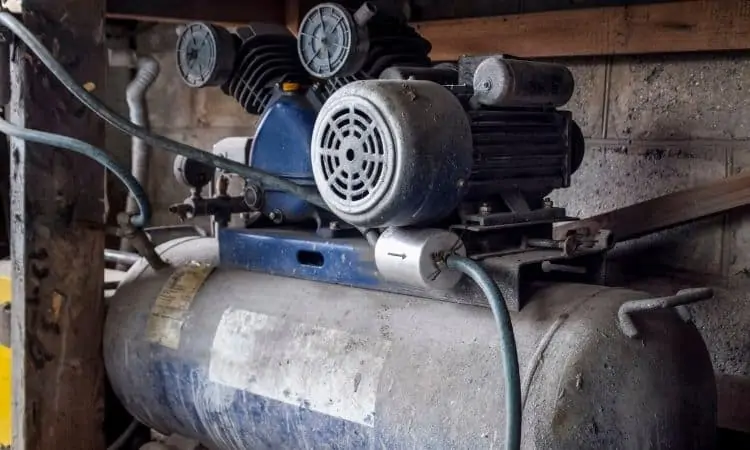Air compressors are used for all kinds of jobs. They’re used for a bevy of different industrial applications and smaller compressors are often found in residential garages and workshops all around the world. And like anything else, proper care is essential for keeping the compressor working well and functioning safely. And one major safety issue air compressor owners need to be aware of is the possibility of an air compressor explosion.
Air compressors can explode under certain conditions. The most common cause of air compressor explosions is excessive corrosion in the tank. If corrosion compromises the integrity of the tank, the pressure of the compressed air can cause the tank to rupture or explode.
Read on to learn what else can cause an air compressor to explode, as well as ways to prevent this safety hazard from happening to you.
Table of Contents
- What Can Cause an Air Compressor to Explode?
- How to Prevent an Air Compressor Explosion
- Can an Air Compressor Explode From Excessive Heat?
- How To Make Sure Your Air Compressor is Safe to Use
- Is it Safe to Leave an Air Compressor Pressurized?
- Are Air Compressors Safe to Use?
- Conclusion
- Can Air Compressors Explode FAQ’s
What Can Cause an Air Compressor to Explode?
There are a number of possible factors that can cause an air compressor to explode. Compressor explosions are rare but they are possible, so it’s important to consider these factors. These include:
- Corrosion (Rust)
- Heat
- Overpressurization
- Faulty Valves
- Manufacturer Defects
- Puncture
- Lubrication Problems
Corrosion/Rust
As mentioned above, rust is the most common cause of air compressor explosions. This does not happen quickly. It takes time because it happens when water is allowed to sit in the tank long enough to cause excessive corrosion, which can damage the structural integrity of the tank. And a tank that’s not structurally sound can eventually succumb to the immense pressure of the compressed air, which can cause an explosion.
All air contains some amount of water, so it’s impossible to prevent water from getting into an air compressor. But you can take steps to make sure that water doesn’t cause corrosion, therefore preventing an explosion from rust. We’ll cover these steps later in this article.
Heat
Overheating a compressor can also cause an explosion, although mechanical breakdown is more likely to occur. Every compressor will have a recommended operating temperature range, and exceeding that range can cause an explosion.
On larger, industrial compressors, the cooling system is essential and needs to be maintained regularly to prevent the compressor from overheating and exploding.
Too Much Pressure
Exceeding the max pressure guidelines on a compressor can cause an explosion in a couple of different ways. If the tank has been weakened by corrosion, too much pressure can make an explosion more likely. Or, if a pressure release valve malfunctions, the excessive pressure can cause the tank to rupture.
Manufacturer Defects
Manufacturer defects that cause anything as drastic as an explosion are rare. If they do happen, they’re usually a little more benign. However, it’s always possible that a compressor is made with defects, such as faulty valves, that can potentially cause an explosion.
Puncture
Since compressors are often used around heavy machinery, there’s a risk of puncture from falling equipment, debris, or dropped tools. Although compressor tanks are made to withstand high pressure, it’s best to take measures to protect the compressor from flying debris or anything else that could possibly damage the compressor and cause an explosion.
Lubrication Problems
Proper lubrication is essential for safe compressor use. If the equipment has improper lubrication, it can cause friction in the moving components and may result in an explosion.
How to Prevent an Air Compressor Explosion
Preventing an air compressor explosion is all about following proper guidelines and generally taking proper care of the equipment. Since corrosion is the most common cause of compressor explosions, let’s start with that.
- Make sure to drain your compressor regularly. This is best done on a daily basis if you use the compressor every day. At minimum, drain the compressor once a week. This will prevent too much water from building up in the tank and causing corrosion.
- Do not exceed the compressor’s recommended temperature guidelines.
- Do not exceed the compressor’s max pressure recommendation.
- If any components seem faulty or don’t fit as they should, do not use the compressor and contact the manufacturer.
- Take precautions to prevent accidental puncture by other equipment.
- Ensure proper lubrication by regularly checking the oil level and adding oil as needed.
Can an Air Compressor Explode From Excessive Heat?
When we’re talking about heat and air compressors, we’re talking about ambient heat, as in where the compressor is stored, and overheating of the compressor.
You generally don’t have to worry about ambient heat with an air compressor, although if you live in an especially warm place, proper lubrication is a bit more important because your compressor will likely be operating at a higher temperature. Optimal operating temperature is between 50-degrees and 90-degrees Fahrenheit.
It’s possible for an overheating air compressor to cause an explosion, and this is where your concern should be with regard to excessive heat. This is usually caused by poor lubrication, which causes friction and can force oil into valves. And that oil can ignite and cause an explosion or rupture.
How To Make Sure Your Air Compressor is Safe to Use
Everything you need to know to make sure your compressor is safe to use can be found in your owner’s manual. Following the instructions there can give you the specifics for proper maintenance and safe use. But for some general guidelines, follow these steps to ensure your compressor is safe to use.
- Drain the air tank regularly — once a day or a minimum of once a week. This valve is easily located somewhere on the underside of the tank.
- Change the oil once a year. This is easier than you think and will help ensure proper lubrication. In the meantime, check the oil levels regularly.
- Change the air filter once a year. You can usually do this by hand or with quick use of a screwdriver.
These basics, along with recommendations from your owner’s manual, can help you ensure that you have a properly functioning air compressor.
Is it Safe to Leave an Air Compressor Pressurized?
Leaving an air compressor pressurized can be safe or dangerous depending on how well the compressor is maintained. If you’re going to be using the air compressor within a few hours, you can leave it pressurized. If you’re not, you should drain the air from the system.
The fact is that if you keep your air compressor pressurized for too long without draining it, you’ll allow accumulated water to corrode the metal inside the tank. And although depressurizing the tank doesn’t automatically drain the accumulated water, these steps are best done at the same time.
Getting into the habit of depressurizing the tank and draining moisture at once can help you ensure a long life for the compressor and safe operation for you and anyone else who uses it.
Are Air Compressors Safe to Use?
With all this talk about exploding air compressors, you may be wondering if they’re safe to use. While air compressors can explode, it’s a fairly rare occurrence. Provided you use common-sense practices and follow manufacturer maintenance tactics, air compressors are safe to use.
Like any other tool, a compressor can be used improperly or poorly maintained, both of which can increase the risk of injury. If you use a compressor in your own garage or workshop, take the time to read the owner’s manual and follow the best practices inside. This will ensure safe operation of the compressor.
If you work with compressors in a commercial setting, your company should have professionals that regularly perform maintenance on the compressor to ensure its safe function.
Conclusion
It takes some doing to have an air compressor explode. The most common cause of these ruptures is corrosion, which happens from inside out. Luckily this is easy to prevent by regularly draining moisture from the air compressor tank.
Other factors can contribute to air compressor explosions, but they’re rare. The best thing you can do to prevent an air compressor explosion is read your compressor’s owner’s manual and follow the best practices laid out therein.
Can Air Compressors Explode FAQ’s
What causes air compressor tank explosions?
Several factors can contribute to air compressor tank explosions. Extreme pressure is the most common cause of tank explosions. When the pressure inside the tank exceeds the tank’s capacity, the tank can rupture. Metal fatigue is another contributing factor. Over time, repeated pressurization and depressurization can cause tiny cracks to develop in the tank, which can weaken its structure.
Manufacturing flaws, such as poor welding or material defects, can also cause tank failures. Additionally, oil deposits and other natural byproducts of atmospheric air can cause corrosion, which weakens the tank’s structure and can lead to explosions.
What is the leading cause of air tank explosions?
Over pressurization is the leading cause of air tank explosions. Most air compressor tanks are designed to hold a specific amount of pressurized air, and when the pressure inside the tank exceeds this amount, the tank can rupture. Over pressurization can occur due to a malfunctioning pressure regulator or a failure to properly monitor the tank’s pressure levels.
Are air compressor tanks safe for use in auto repair shops?
Air compressor tanks are generally safe for use in auto repair shops, but it is important to take proper precautions to prevent accidents. One of the most critical steps is to regularly drain the tanks of excess moisture and other debris.
Moisture buildup can cause corrosion and rust, which can weaken the tank’s structure and increase the risk of tank failure. Additionally, it is important to check the pressure levels and to use a pressure regulator to prevent over pressurization.
Are air compressor tanks safe for use in construction sites or work zones?
Air compressor tanks are commonly used in construction sites and work zones, and they can be safe if properly maintained. It is important to regularly inspect the tanks for signs of damage or corrosion, and to drain them regularly to prevent rust buildup. Additionally, workers should be trained on how to properly use the tanks and to follow safety protocols to minimize the risk of accidents.
Can hot air contribute to air tank explosions?
Yes, hot air can contribute to air tank explosions. When the temperature inside the tank increases, it can cause the pressure inside the tank to increase as well. If the pressure exceeds the tank’s capacity, it can cause the tank to rupture. This is why it is important to use a pressure regulator and to avoid exposing the tank to excessive heat.


